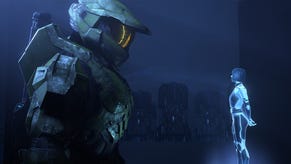Halo Infinite: the big interview with 343 Head of Creative Joseph Staten
"This truly is a beta."
Joseph Staten, Head of Creative at 343 Industries, looks knackered as he peers into his webcam. He admits as much. It's early morning in Seattle, where the studio is based, and the second morning after Microsoft released Halo Infinite's multiplayer weeks ahead of the game's street date. It would have made for one hell of a surprise, had it not leaked beforehand.
Staten, at least one coffee down already, is well aware of the feedback so far - the good, the bad and the ugly. The MP launch has been smooth - perhaps remarkably so compared to the launch of some of its first-person shooter rivals. Players love the gameplay. I love the gameplay. But there's significant and reasonable backlash to Halo Infinite's battle pass and progression system.
343 has already acted with tweaks. During our half-hour interview, Staten mentions even more tweaks will be announced later that day. Halo Infinite Season 1 has begun, but Halo Infinite is in beta, Staten insists. There is time to react between now and the official 8th December street date.
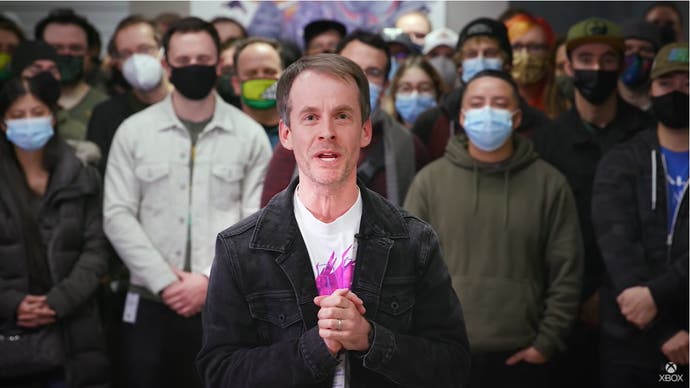
So, I spend my time with Staten discussing the development of Halo Infinite, which of course was once meant to come out alongside the Xbox Series X and S November last year. Staten came onto the project 15 months ago, reportedly to get Infinite "back on track" after what's been a troubled development. But what work exactly has he done since then? It's something we dig into during the interview below.
We also talk about Halo Infinite's campaign (hands-on impressions here), which Staten insists was deliberately designed to be one players will actually complete after user data showed most people don't finish Halo campaigns.
And what comes next? 343 is set up to treat Halo Infinite as a live service, which means seasons of content, battle passes and the delivery of missing modes, such as campaign co-op and Forge. Does 343 also plan to release new campaigns, perhaps exploring more of Zeta Halo? It's something I put to Staten.
How are you doing? How is the team doing? You surprise-dropped multiplayer on Monday, weeks ahead of the street date, which never happens. It must be a really interesting time for you guys.
Joseph Staten: Well, as you can probably tell from my face and my voice, we're a little tired. But we're also very happy that we were able to celebrate the 20th anniversary, give fans a surprise - although over the weekend, there were some leaks. It was Pringles! It was always going to be Pringles! No, it wasn't their fault at all. Yeah, I mean, it was really motivating for the team to have this special moment where we were hoping we could surprise people. But also kick off what truly is a beta. If you're looking at our communications out to fans, we really are taking these three weeks before December 8th to make sure that our systems are good to go. We're paying really close attention to things like our progression system and challenges and making adjustments in the next three weeks.
So as happy as we were to release multiplayer early, I just always remind people when I talk to them, this was not a marketing event. This truly is a beta. It's really important that people give us feedback, let us know what's not working well. We are making adjustments for sure to make sure the experience is rock solid and as fun as it can be for December 8th.
That point you're making about it being a beta - it doesn't feel like it to me. It feels great to play. I know what you're talking about regarding battle pass progression and challenges. You've probably seen the feedback everyone else has, but it feels really there.
Joseph Staten: Yeah. Well, thank you. I appreciate that. But you know, look, we are a free-to-play game now. We know we're competing with other really experienced free-to-play experiences out there. And when we ship even a beta, we want to make sure that we show up as Halo with as much quality as possible, a really stable performant experience that runs great on every platform.
I'm so used to online games coming out and things just not working properly at launch. But this has been smooth. I don't struggle to get games. It feels good. Would you put that down to the technical previews you had?
Joseph Staten: Well certainly the technical previews really, really helped. They were, as we said at the time, genuine technical previews. This was our opportunity to get a lot of people in and playing, really bang on our systems, make sure we're stable. But that was the end result of us taking another year with the game. One of the principles we decided on when I joined the team a little more than 15 months ago, is that we need to make sure that when we ship Infinite, that it's a stable, performant, high-quality, looking as good as it can possibly look on every single platform, whether you play on an old, eight year-old Xbox One or brand new cutting edge PC, Halo Infinite should run great.
And that's just hard known game development work. It just takes months to make sure that you're stable and look good across every platform. And that's what we spent the last year and more really focusing on, so that we could come to these moments in time where we launch the game, and no matter what you're playing on, that it runs great, and our backend services are ready to go. So really it's just a testament to this team digging in, super hard work over the last year to get us to this point.
On progression, the battle pass and challenges, do you have time to make any meaningful changes before 8th December? Is that something you can actually do at this point?
Joseph Staten: Yeah. We look at it in terms of small rocks we can move and bigger rocks that we're going to take more time to move. When we look at things like challenges and which challenges are working, which challenges aren't working, how people are progressing match-to-match inside the battle pass, the experience that they're earning for specific challenges, those are all things that are smaller rocks that we're able to move pretty easily. We can adjust those things relatively quickly.
We don't want to overreact to the first 24 hours or 48 hours. We really want as we grow into being a real service, to look at the data, to look at our goals and ask ourselves, if this was what we expected players to level at, like the levelling rate, is that actually happening? If no, then what's broken? What changes can we make rapidly to get things in-line with the way that we wanted it to be? That's all work that we're doing actively now.
And then there are bigger rocks that are just going to take longer to move. When we think about things like a career progression system where you're levelling up a Spartan Rank - not your ranking in terms of ranked playlist, but your Halo Reach-style, Halo 5-style, actually having levels that you're earning - those are systems that we wanted to land for launch, but are just going to take more time to land.
It's going to be a constant challenge to address some of those bigger rocks that I know players have completely legitimate feedback about. But we've got a couple big things that we still have to deliver to fans: campaign co-op and our Forge toolset are really big promises that we've made that we need to make good on.
And so even with a big game like Halo, a big team like the Halo team, we do have multiple priorities that we're always trying to balance. And so it's going to take probably a little bit more time than players would like to move some of these big rocks. But what I really want everybody to understand is, we absolutely hear them - these are our priorities, too. We just have a lot of big priorities that we're trying to balance. And the next year is really going to be a lot of that work, just us trying to figure out how we can get things out as quickly as we can, but also high quality across every platform. We're not going to compromise on a quality experience, we're not going to rush things. That was another principle that we agreed to when I came back to the team, is we're going to take the time it requires to do it right so that we may deliver an experience to players that is a high-quality experience, and that it feels like we put the time and effort into it to make it right, because we did.
You touched on it there: campaign co-op and Forge. You had said campaign co-op would come roughly three months after launch, and I know you've extended the first season to May. What does that mean for your target windows for those two features, which I know everyone is really looking forward to?
Joseph Staten: Yeah, at the time that we talked about campaign co-op and Forge I said our goal is to ship campaign co-op in Season 2 and our goal is to ship Forge with Season 3. Yes, we are extending Season 1. So our goal still remains what I said before, which is to ship campaign co-op with Season 2 and Forge with Season 3. But those remain goals. Those remain targets. And we can't commit to any hard dates right now, because as we're seeing with this multiplayer beta, other things might move up in the priority stack for us. If it turns out that our progression system just isn't working the way that we intended, if we need to move some of these bigger rocks that I talked about sooner then we as a team will make those decisions and will clearly communicate to our fans why we're why we're doing certain things.
To be clear, we haven't made any decisions along those lines yet. We're still 48 hours into our beta. But we are listening, and we are genuinely listening and learning from our fans. And we're not just going to stick to a plan if we learned that there are other more important priorities.
So that's where we are as a team right now. I often say to the team, look, it was a really challenging year that we just went through, a lot of hard work, I think that this coming year is going to be filled with at least as much, if not more, good, hard work for the team as we really stand up this live service. And really make good on all of our promises to fans.
I remember when you made the announcement about campaign co-op and you were trying to explain how challenging it was for you guys to make work, I didn't really fully understand it because at the time I hadn't played campaign. I have played campaign now, and I have no idea how you can marry what would be traditional Halo campaign co-op with the game that you've created in the sense that someone could be doing a key story mission over here, and then someone else could be messing about at the edge of the map in a Warthog knocking stuff off the ring.
Joseph Staten: Well, the good news is that campaign co-op has been playable for some time. It's playable now. But the goal is we want it to be a great experience. We don't just want to ship a campaign co-op that barely works. We want to ship a campaign co-op that's stable, that's robust, that has the features players expect. And we're also doing some other things that we haven't talked about yet to really make meeting up with your friends, and you're jumping into the game, good just not for campaign, but even better for multiplayer, too. So when it comes to shipping campaign co-op, we have a lot of other things that are kind of branches off that central trunk of campaign co-op that we think are an opportunity to just improve the whole game experience.
But yeah, I mean, it just is a challenge. You played the campaign. It's the most expansive world we've ever made, a lot of player choice about how to address certain missions. It's just a much bigger problem set when it comes to playing together with your friends. And we're just going to take the time to get it right. But the good news is that work is progressing, we're making really good progress, and campaign co-op is as fun to play as it's ever been - and maybe even more so in this new style of game that we've made.
You've got a free-to-play multiplayer here. The Halo campaign remains premium. But you're launching on Game Pass and on Steam. We've already seen impressive Steam concurrents. Is the expectation from your point of view that because of the way this game has been released, because of the way that you can access it, that it has the potential to be the most-played Halo game of all time at launch? Is that something you have to actually think about to cater for given Game Pass and free-to-play?
Joseph Staten: Well, part of having a nice stable and smooth launch - knock on wood - so far is we did anticipate that it very well could be in terms of server load and other considerations. We haven't talked about numbers yet. I'll let our PR team figure out what the right time to talk about those numbers is, but it's been a very successful launch for us across the board.
We hoped that it would be. We'll have to see through this weekend. The first couple of weeks really do show you how you're doing. I think we've definitely got a shot to be pretty successful. It's a combination of being free-to-play, like you said, and launching on PC day one - and I'm really proud of the PC experience, just how robust it is - doing them both at once and thinking about them as day one first class citizens on both platforms.
I'd like to talk to you a bit about campaign because I know you came on board to work on that. You were there back in the day working on Combat Evolved. I see so much of the early levels of Combat Evolved in this, Silent Cartographer, Truth and Reconciliation... back then you couldn't have possibly known those levels you were working on would have such a clear influence over the latest Halo game coming out 20 years later. It seems remarkable to me that these levels have had such an incredible impact, that they are clearly an inspiration for the next big Halo game all this time later.
Joseph Staten: Yeah. I recently went back and played Halo CE with my son, who's now 19 and wasn't even born at the time Halo came out. And I was reminded that Silent Cartographer, Truth and Reconciliation, especially those two missions from Halo 1, just remain really well-designed missions in terms of their tone, the way they're paced, just the geometry is great for gameplay. They're sort of self-contained, little mini three-act plays. They're just very complete experiences, deeply satisfying.
But what it all gets back to is it really does put you in this world that you feel is expansive, that's filled with mystery. It really does feel like you're in an alien place as this powerful super soldier doing important things. And that spirit, that feeling of Halo... you know, we talk about Halo Infinite as a spiritual reboot, and I know the team absolutely went back and tried to capture some of that feeling.
You played the campaign a little bit. You know you begin Halo Infinite as the Master Chief with a gap in your memory. You don't have all the answers. It is a mystery story. You're paired with an AI companion. You transition from space to the surface of this alien world. It is not a hard reboot of Halo 1. It's not a retelling of the Halo 1 story, but spiritually it does really feel like it has a direct connection back to that first game.
That was the team's intention. Those decisions were made long before I arrived. And when I first played the campaign, I was just really excited about the choices that the team had made. I thought it was really, really smart. And then we just spent a year doubling down on what was already great about the campaign and tried to make it even better.
You even have that Vietnam war-style, Master Chief in the Pelican as it's flying, surveying the battlefield, leap out moment, which just crystallised the Silent Cartographer magic moment for me, it really brought those memories back. It seems like rekindling that is clearly one of the goals of the campaign.
Joseph Staten: Yeah, that's it. Absolutely. It absolutely is. And that's the heart of this idea of a spiritual reboot. Look, it's been six years since we released a Halo campaign. Even if you're a diehard Halo fan who played all the Halo games, played Halo 5 - we don't expect you to remember everything that happened in those previous Halo games and what happened in Halo 5. We want old fans and especially new people to jump in, be able to immediately get up to speed with the story, have fun, understand what Master Chief is all about. Certainly, if you've played previous Halo games, there are extra layers in this one that will really make it an even more powerful story, but we wanted to make sure that it wasn't a barrier to entry for people. Not having played all the previous Halo games shouldn't stop you from enjoying this one. And that was part of the idea of a spiritual reboot too.
That obviously brings challenges because you're competing with memory. And then by going open world, you're less able to create that bespoke, almost self-contained mission level that Halo's campaign was famous for. You don't always have that opportunity to make that really incredibly-crafted mission. How do you marry those two design goals, when you're making an open-world Halo game?
Joseph Staten: Well, I think the first thing that we did was not actually try to make an open world game - the way that I think you traditionally understand open world games. I love playing open-world games - I'm playing through Far Cry 6 right now. I've loved the last Assassin's Creed game and a variety of other open-world games, too.
But our goal is really not to drive lots and lots of hours of player engagement with systems that encourage players to play for a long time in our game. We don't have a crafting system for example. I don't think crafting is really appropriate for Halo. The Master Chief is a super soldier, he doesn't need to go and gather things to make stuff. He goes and kicks the teeth in of the enemy and takes their stuff and then moves on. That is what Spartans do. They don't hunt animals and then use their skins to make their armour. They go and destroy alien targets, take their stuff and move on.
So for us as a Halo game, those kinds of systems didn't make sense, just thematically. But we also wanted to create an experience where players didn't have to spend dozens and dozens of hours to complete the story. One of the great sadnesses for me as a game developer is looking at the historical data of how many people actually finish Halo games, or who actually finish games that they start - guess what? It's really low!
We really wanted to do as much as we could to encourage people to finish this game. And that meant making sure that it wouldn't take too much time. And then if you just were enjoying the linear story, that golden path, as we call it, through the game, that the game was very clear to you as a player - 'hey, this is where you need to go next to follow the thread of the story.'
Now we're gonna tempt you along the way off the golden path with this cool Banished war base that's making noises, or this red smoke on a hilltop where you know marines are waiting to be rescued. But if you choose to do none of those things, that's okay. You don't need to do them to progress. You can just continue along the golden path. You don't have to worry about all these other loops and game systems that are required to make progress. Halo Infinite has none of those things that you would see in a typical open-world game. This is simply the most expansive, wide-open Halo game we ever made. But the important part about that is it's still a Halo game.
I've got that thing where I see icons on a map and I have to clear them. I have that compulsion to go, I need to go there and just clear that and get that completed. I don't know why I feel a need to do that, but I just have to hoover it all up off the map, you know?
Joseph Staten: I hear you, and in our user research tests that we've done and other player feedback, we've gotten that feedback from people who have played open-world styled games, and see that map and see the icons and immediately get into that mode of like, 'well, I guess I got to do all this stuff if I'm going to finish this game.' You know, this is the first time we've made a game like this. And as we look toward other campaign experiences in the future, we're going to take a lot of learnings from this and really tune our system, because we don't want players to look at the map and feel like, 'ugh, I got a lot of work to do.' We really want players to look at our map and say, 'wow, there's a lot of stuff I could do, if it seems interesting, but I don't have to do any of that.' If I just want to continue the story and play through I can do that and be successful. There's no progression system or leveling that I need to do that's hard-blocking me from entering any of these dungeons or making it impossible for me to complete them. Halo Infinite has none of those. None of those things. If you want to walk the golden path, you can absolutely do it. If you want to stray off the path because you're curious, go for it, but it's not required.
In terms of Halo Infinite being a live service game, we've all seen the "campaigns" plural hint. Do you plan to expand the story with meaningful DLC in some way? How will it actually work? Is more of the ring going to be made available? I'd love to know what the vision is.
Joseph Staten: Well, today unfortunately I can say absolutely nothing about any of that! But I will say that Zeta Halo, this new ring that you find yourself on, it's known in the Halo universe to be the most mysterious of all the Halo rings. It has millions of years of secrets. It's certainly a really rich place to set new stories. And we're eager to explore those in the future. But I can't say anything about that today.
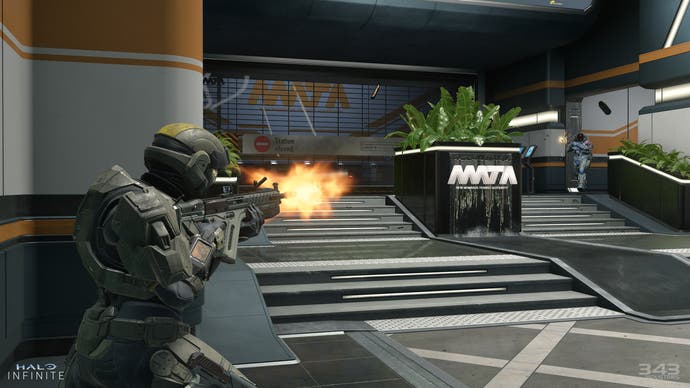
You came onto the project last year in the middle of a pandemic. The game had been delayed or was about to be delayed for what ended up being an entire year. What were the development issues you walked into, and what was the work you did? How did you get the game into the state it is in now compared to what it was like then?
Joseph Staten: The short answer is, when I arrived on the team and I played the game, it was immediately clear to me - and other people on the team knew this as well, but sometimes a set of fresh eyes just helps clarify things - that the campaign's foundation was really, really strong, that the big choices that the team had made were really, really good. We've talked about some of them: this wide open expansive world, adding equipment like the grapple shot - all these things were really great decisions.
But there were just elements where more work could be done to make them even more impactful. So we really wanted to do a better job of training people, teaching people how to use equipment, to making sure that they understood it and could have fun with it right from the get go. There were marines in the game, but they were very limited in terms of what they could do. You ended up feeling kind of lonely in this bigger world without any marines. So we did a ton of work to make sure marines could basically pathfind everywhere. Like, everywhere that you went in the world, if you had a Warthog filled with marines and they would follow you as best they could, up a mountain, like into a cave system. That took a ton of work.
And we added things like capture points, were there are marines who are caught up in energy ropes - you can free them and load them up. So just creating systems like that. And a whole bunch of other things that we identified. I think we had about 10 or 12 big, what we call epic tasks, to go and make better throughout the world. Another example of this was, we wanted to really elevate some of the characters in the game to true mini-bosses, and have fights with them, where it felt like a meaningful moment where you could tackle one of the leaders of the Banished. You probably already played the Tremonius fight - there are more of them throughout the campaign. We just wanted to spend more time on those, to have cinematic intros to them and make sure that the bosses have really interesting behaviours.
There are many other examples I could provide, not the least of which being to make sure the game ran great on whatever platform you have. We just committed ourselves to a set of principles, and then a good handful of these epic tasks, and then went after them for campaign and multiplayer.
Really, that was my job coming in: help the team focus on what would matter most, and then make sure that we were getting good feedback from our great user research team at Xbox, that we were giving ourselves time to actually flight the game with these technical previews to make sure that by the time we launched, we had invested in good things, we had validated that our investment was working, so we could have a successful launch.
In retrospect, it sounds pretty easy and straightforward. But coming onto the team in the middle of a pandemic, you know, meeting everybody remotely... it was a very interesting time to jump in as a creative leader to a project. Ultimately I think all that work really paid off, and I'm just super excited about being on the team. I should also say that was half of my job. The other half of my job was planning for the future, which we can't really talk about today. But that work has been really enjoyable too.
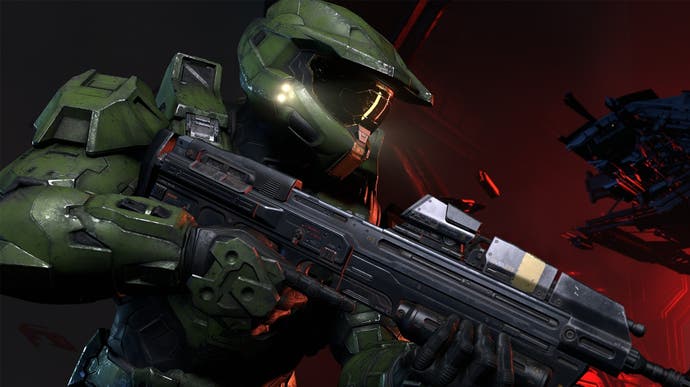







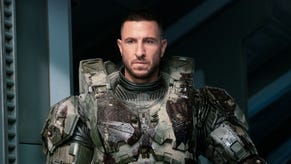
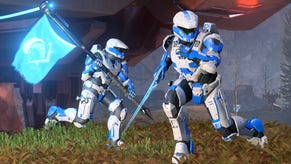
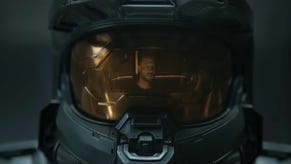


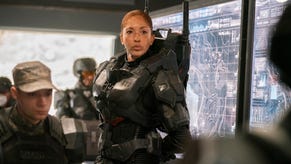
.gif?width=291&height=164&fit=crop&quality=80&format=jpg&auto=webp)
